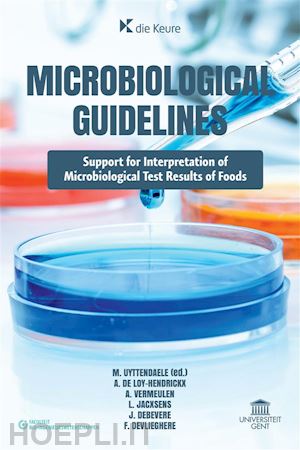Food plays an essential part in everyday life.
Food should be tasty, healthy, sustainable and preferably not too expensive. But food should also be safe and with sufficient guarantees on maintaining good quality aspects until the end of shelf life. The various actors in the food supply chain have an interest in verifying the expected quality and safety by means of microbiological analyses of food. Measurement brings knowledge and microbiological guidelines help in the decision-making process for judging the acceptability of food or food production processes.
The present handbook provides microbiological guidelines and current applicable EU legal criteria (status 1.1.2018) for a wide range of food categories (dairy, meat, seafoods, plant-based foods, bakery products, composite foods, shelf-stable food, water) and subcategories therein, based upon the type of food processing and intrinsic characteristics of the foods. This book can be consulted to provide quick answers on the expected microbiological contamination of foodstuff. It can help in interpretation of test results in assessing good (hygienic) practices in the production of food, determining the shelf life and ensuring food safety. The handbook also presents definitions of the wide variety of foodstuffs available and some reflections on, in particular, food safety issues or the on-going debate for some food items in assessing microbial quality.
This book provides crucial information about food safety, for the use of students and professionals.
EXTRACT
"First we eat, then we do everything else"
M.F.K. Fisher
Food plays an important part in everyday life. But when being a food scientist or in the food business, food gets to be an even bigger part of your life. Our team at the Food Microbiology and Food Preservation research group (FMFP-UGent) at Ghent University during its academic tasks in education, research, scientific activities at committees, but also in interaction with many food companies and stakeholders in the food supply chain in projects or contract work, has built up considerable expertise on the microbiological analysis of a large variety of foodstuffs. Being situated in Ghent, and thus close to Brussels, the heart of Europe, we intrinsically have to understand and deal with legal EU criteria or action limits. The latter is the reason why this book is mainly oriented towards inclusion or making reference to EU legal microbiological criteria for foodstuffs as well.
ABOUT THE AUTHORS
The main author, Prof. Mieke Uyttendaele, leads, together with Prof. Frank Devlieghere, the Food Microbiology and Food Preservation Research Group (FMFP-UGent) at Ghent University, Belgium. Her teaching and research area covers aspects of microbiological analysis of foods, food safety and food hygiene. She has built over twenty years of experience by executing, initiating and coordinating various projects in this research discipline dealing with sampling and testing to collect baseline data on the microbial contamination of foods, looking into the virulence of food-borne pathogens, elaborating challenge testing to study the behavior of food-borne pathogens. All this information serves as an input for quality assurance and microbial risk assessment to support food safety decision-making and setting microbiological criteria. She was/is the promotor of more than 25 Ph.D students (including EU and non-EU citizens).
Throughout her career, Prof. Uyttendaele has published more than 270 peer reviewed scientific papers, authored several book chapters and presented at numerous international Conferences/Workshops. Throughout the years she has also used her scientific expertise in interpretation of test results for analyses obtained in routine monitoring or analysis executed at the food service lab at FMFP-UGent.














